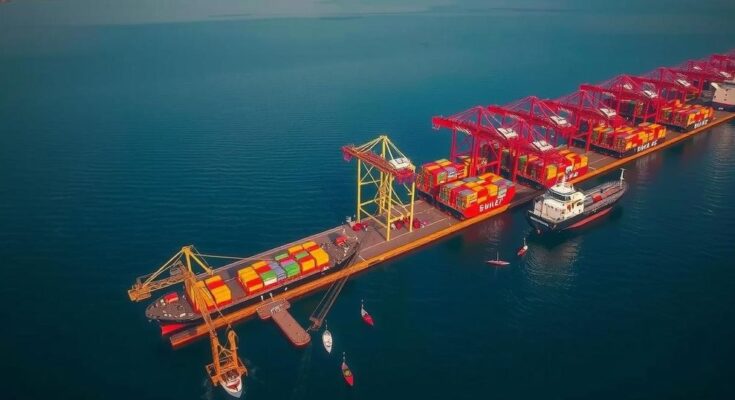Sudan has cancelled a port agreement with the UAE in protest against its alleged support for the RSF amid ongoing armed conflict. Finance Minister Jibril Ibrahim stated the move protects Sudan’s sovereignty. The cancellation reflects a broader shift in Sudanese foreign policy as the country seeks to assert autonomy while addressing internal discontent and a humanitarian crisis.
Sudan has officially cancelled its memorandum of understanding with the United Arab Emirates (UAE) for the development of the Abu Amama port along the Red Sea coast. This decision has been interpreted as a subtle protest against the UAE’s purported support for the Rapid Support Forces (RSF), a paramilitary group currently engaged in a violent conflict with Sudan’s military government. Speaking at a press conference in Port Sudan, Finance Minister Jibril Ibrahim emphasized that the cancellation was intended to protect Sudanese sovereignty, stating that the agreement was not legally binding. He asserted that Sudan would not give up “one centimetre” of its coastline to foreign interests. This strategic move coincides with allegations of the UAE’s assistance to the RSF, heightening Sudan’s political maneuvers to diminish foreign influence. The UAE and Sudan have a historically complex relationship, marked by both cooperation and friction. An agreement signed in December 2022 promised substantial investment of approximately $6 billion from the UAE for the port’s development, which included various local projects. However, the cancellation reflects a shift in Sudan’s foreign policy aimed at reinforcing its autonomy amidst growing regional tensions. Locally, the decision has been met with approval from residents in eastern Sudan, particularly in Port Sudan, who anticipate that the government will redirect its focus toward developing domestic infrastructure and job creation. There is a strong community sentiment that investments should serve local needs rather than being dominated by foreign interests, which are perceived to threaten the local economy. However, the Sudanese government must navigate the complexities of diverse political factions with differing views towards the UAE and foreign relations. This decision occurs against a backdrop of a severe humanitarian crisis in Sudan, characterized by soaring inflation, currency devaluation, and escalating living costs that have significantly impacted the population. Moreover, the implications of this cancellation extend beyond Sudan’s borders. Regional stakeholders, including Saudi Arabia and Egypt, maintain interests in the Red Sea, necessitating a careful approach by Sudan as it balances international influences while addressing urgent internal challenges. The decision underscores the intricacies of geopolitical relationships in a troubled region, as Sudan endeavours to pursue its national interests vigorously.
The cancellation of the port deal between Sudan and the UAE follows a backdrop of escalating tensions resulting from the RSF’s violent confrontation with Sudan’s military forces. The UAE’s alleged support for the RSF has led Sudan to reassess its partnerships, particularly those related to critical infrastructure investments. Historically, Sudan has enjoyed relations with the UAE characterized by investment and cooperation; however, the recent political climate necessitates a reevaluation of these ties to safeguard national sovereignty and respond to internal conflicts. This situation is further complicated by emerging humanitarian crises that demand international support and concern for regional stability.
In conclusion, the cancellation of the Red Sea port deal signifies Sudan’s increasing assertion of sovereignty against perceived foreign intervention, particularly from the UAE amid ongoing conflict with the RSF. This decision may enhance domestic support while also reflecting a strategic shift in Sudan’s foreign policy. Nevertheless, it raises significant implications for Sudan’s external relations with regional powers, all of whom have vested interests in the area, while the country grapples with severe humanitarian challenges that require immediate attention and assistance.
Original Source: www.theeastafrican.co.ke




